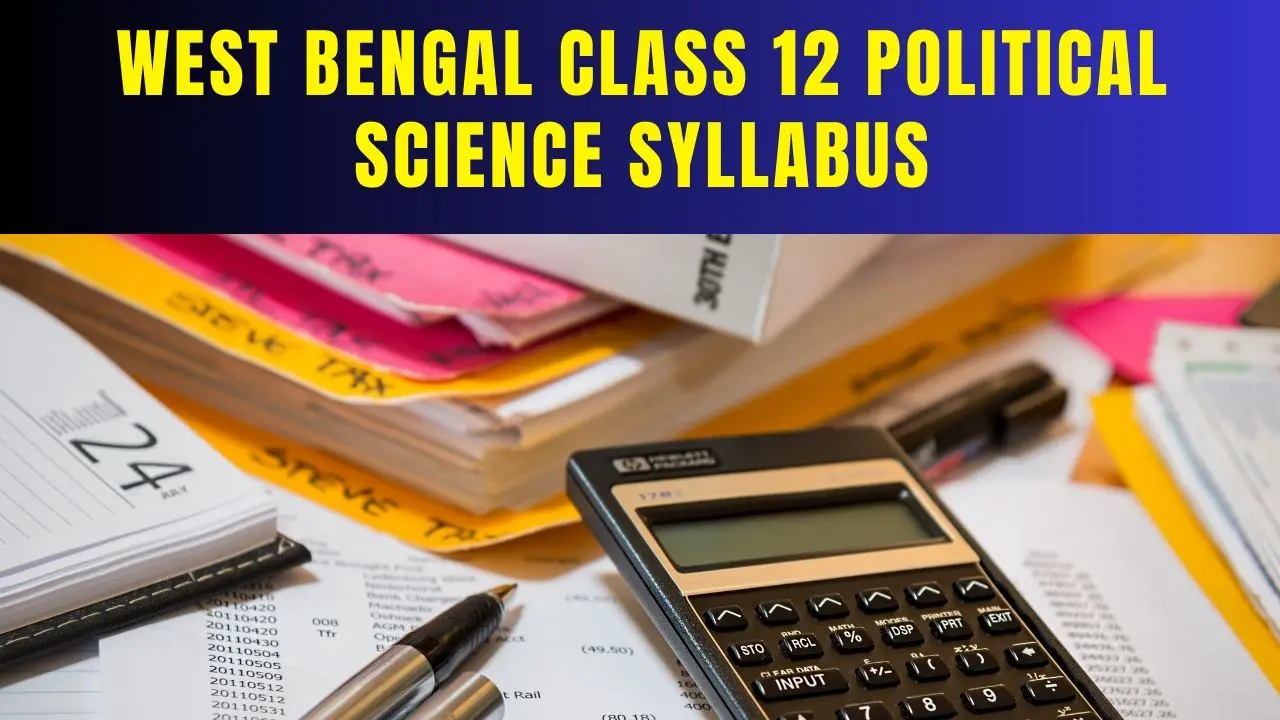West Bengal Class 12 Accountancy Syllabus: Class 12th WBSCHE Commerce refers to the Commerce stream of education for students in the state of West Bengal, India, conducted by the West Bengal Council of Higher Secondary Education (WBSCHE). This crucial phase of education typically caters to students between the ages of 16 and 18 years and serves as a stepping stone towards their future academic and career pursuits. The Commerce stream offers a diverse range of subjects, including Accountancy, Economics, Business Studies, and Mathematics, providing students with a comprehensive understanding of the business and financial world.
West Bengal Class 12 Accountancy Syllabus
Before commencing their preparation, students are advised to thoroughly review the West Bengal Class 12 syllabus for all subjects. This essential step ensures that they are aware of all the units and topics covered in each subject. The syllabus is readily available on the official website of the West Bengal Board, providing a comprehensive guide for students to plan their exam preparation effectively and strive for good marks.
The West Bengal Board exams are scheduled to take place in March 2021. Once students have completed the syllabus, it is highly recommended that they practice the West Bengal Class 12 model papers.
WBCHSE Syllabus 2023 for Accountancy
The WBCHSE Syllabus 2023 for Accountancy in Class 12 is designed to provide students with a comprehensive understanding of accounting principles and practices. The paper is divided into three parts, with students having the option to choose either Part B or Part C. However, Part A is compulsory for all students.
The syllabus covers various crucial topics that are essential for students’ knowledge and development in the field of accountancy. By studying this syllabus, students will gain proficiency in financial accounting, partnership accounting, company accounts, and other relevant concepts.
Additionally, the syllabus emphasizes the application of accounting principles in real-world scenarios and fosters analytical and problem-solving skills. Students can refer to the table below to access the detailed Class 12 syllabus for Accountancy provided by the West Bengal Board.
Part A
Part A of the Class 12 Accountancy syllabus for West Bengal Board consists of various essential topics related to partnership and capital accounting. The first section, “Introduction to Partnership,” carries 10 marks and focuses on familiarizing students with the fundamentals of partnership, its characteristics, and the importance of partnership agreements.
The second section, “Reconstruction of Partnership,” holds 25 marks and delves into the methods of reconstruction, admission, retirement, and dissolution of a partnership firm, thereby providing students with a comprehensive understanding of the dynamics involved in such scenarios. The third section, “Accounting for Shares Capital,” carries 20 marks and covers the accounting principles and practices related to shares issued by a company. It includes discussions on the issue and redemption of shares, share forfeitures, and the treatment of share capital in the balance sheet.
Lastly, the fourth section, “Accounting for Debentures,” carries 5 marks and focuses on the accounting procedures related to debentures, including their issue, redemption, and interest payments. This well-structured Part A of the syllabus equips students with the necessary knowledge and skills in partnership and capital accounting, enabling them to excel in the Class 12 Accountancy examination and fostering a strong foundation for their future pursuits in the field of finance and accounting.
Part B
Part B of the Class 12 Accountancy syllabus for West Bengal Board comprises two significant topics that focus on the analysis of financial statements. The first section, “Analysis of Financial Statements,” carries 12 marks and delves into the process of evaluating and interpreting financial statements to assess a company’s financial performance, stability, and profitability.
This section equips students with the skills to use various financial ratios and tools to make informed business decisions and understand a company’s financial health. The second section, “Cash Flow Statement,” holds 8 marks and emphasizes the preparation and interpretation of the cash flow statement, which provides valuable insights into the cash inflows and outflows of a company during a specific period.
This section enables students to comprehend the cash flow position of a company and evaluate its ability to meet its financial obligations. Part B of the syllabus equips students with essential analytical skills and a deeper understanding of financial statements, enabling them to excel in the Accountancy examination and making them well-prepared to pursue careers in finance, accounting, and related fields.
Part C
Part C of the Class 12 Accountancy syllabus for West Bengal Board encompasses diverse and practical topics that aim to equip students with modern accounting tools and hands-on skills. The first section focuses on “Electronic Spreadsheet,” “Use of Spreadsheet,” and “Graphs and Charts,” collectively worth 14 marks.
This section familiarizes students with electronic spreadsheets and their applications in managing financial data, performing complex calculations, and presenting information in the form of graphs and charts for better visualization and analysis. The second section, “Database Management System of Accounting,” carries 6 marks and emphasizes the role of database systems in organizing and accessing accounting information efficiently.
This knowledge enables students to understand the importance of data management in accounting practices. The final component of Part C is “Project Work,” which carries 20 marks. This section provides students with an opportunity to engage in a practical accounting project, encouraging them to apply theoretical concepts learned throughout the course to real-world scenarios.
By undertaking project work, students develop critical thinking, research, and presentation skills. Part C of the syllabus ensures that students are well-versed in using contemporary accounting tools and techniques, making them competent professionals in the digital age and preparing them for successful careers in the field of accounting and finance.

